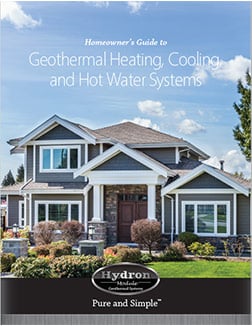What's it like to live in a home that has geothermal air conditioning versus a conventional air conditioning unit? Maybe your current system is at the end of its lifespan and is struggling during the summer heat, or you're building a new home and want to make the right choice for your long-term comfort and savings. Either way, if you're curious about geothermal AC, we'll help you sort through some of the significant differences and advantages of geothermal cooling systems over traditional AC units.

Geothermal Cooling Vs. Traditional AC
What is Geothermal Cooling?
Unlike traditional systems, the heating and cooling functions in a geothermal system are all packaged within the same unit: the geothermal heat pump. This technology is made possible by underground energy collectors, or loop systems, that are buried below the frost line where the soil temperature stays between 45°F - 70°F. These loop systems transfer underground latent solar energy to your house during the winter and dump heat energy from your house to the cooler ground in the summer. This process makes for an extremely reliable, consistent method of heating and cooling your home, as it relies on a loop system (which has a life span of 100+ years) transferring heat energy from the sun (which has been around for a while).
How Does Conventional Air Conditioning Work?
Traditional AC units and geothermal systems both work off of the same concept: Transport hot to cold. Both systems extract heat from indoors in the summer and inject heat into the home in the winter. The differences in the systems arise when we look at how they accomplish this feat.
A conventional AC unit utilizes an evaporator coil, typically housed in a metal box in your basement or attic, which circulates refrigerant to remove heat energy from your home's air. Then, that heat energy is moved to an outdoor unit that then radiates that heat into the outside air.
Regarding Efficiency
If you look closely, you can see where the issues with conventional AC units arise. At peak load, the unit has to dump heat energy from your home into the even hotter air outside of your home. The air on a midsummer's day can only take so much energy, similar to how your sweat never evaporates when it's especially humid outside.
When it comes to efficiency, geothermal AC systems have the advantage over conventional central AC options and can save the homeowner up to 50% on their monthly electricity costs. How is this accomplished? Well, a geothermal heat pump has the luxury of sending all that extra heat energy to the, on average, 55°F earth as opposed to the 90°F air. This means that the unit has to work less to do more. Hot and humid summers are a full time job for air conditioning systems, and when you're using an inefficient AC unit for all that continuous work, you're likely to see some nasty price spikes during those months. A geothermal cooling solution will heavily mitigate that unwanted jump in bills and energy consumption.
Life Span: Geothermal versus Conventional Air Conditioning
Conventional AC units typically have a lifespan of 13 years on average, often with the main components significantly degenerating within 5-10 years. Critical components, like the compressor and condenser, are stored outside due to the noise and disruption they produce, which leaves them exposed to the elements and at risk to damage. This increases the frequency of maintenance costs and reduces the overall efficiency of the unit over time.
On the flip side, a geothermal heat pump lasts almost 25 years, with the in-ground loop system lasting over 100 years. It's a far more straightforward, less volatile method of heating and cooling. The geothermal heat pump is extremely quiet, meaning you can house it inside and out of the elements. This minimizes the wear and tear on the internal components of the unit, all while maximizing long-term, low-maintenance efficiency! You also save space in your back yard, so feel free to enjoy those warm evenings outside without being disturbed by the sound of a conventional AC unit kicking on.
Simple Is Better
In the age of people trying to simplify their lives (think tiny homes, Marie Kondo, and minimalism), we are firm believers that this concept can and should be applied to your home's heating and cooling systems. If you've got a conventional central air conditioning system in your home, that's not going to supply heat once the seasons start to change. This limitation means you'll have to install a dedicated heating system as well.
Maybe you'll choose natural gas, electricity, or even oil. Perhaps you'll have space heaters that supplement a fireplace or wood -burning stove. Whatever option you go with, when summer rolls back around, these systems will sit dormant for the entirety of that season. Best-case scenario: You'll have to have two separate systems that control the environment within your home.
Geothermal does all that within one quiet, compactly packaged unit, and is a much more straightforward means of heating and cooling your home all year round!
One Step Closer to Net-Zero
As solar power becomes more and more prevalent, the cost of the product and installation is reducing steadily. What does this mean for you? Well, if you don't already have solar energy powering your home, it's very likely that in the next decade, that could become a reality for you. So, in making any upgrades to an existing home or in new-home construction, you should take into account this potential new age of energy production.
Conventional AC units have efficiencies that are far too low and will require an array that produces the kWh (kilowatt hours) needed to compensate for an underperforming HVAC system. With geothermal's extraordinary efficiencies of up to 500% and comparatively minute power draw, it's by far the best option when future-proofing your home. Both solar and geothermal have federal and local tax incentives that are active in 2019! However, if you don't feel like installing both at once, appropriately insulate your home and start with geothermal. Once you see the significant reduction in your utility costs, your dreams of a net zero building will be attainable before you know it.
Not Convinced Yet?
If you, like me, are someone that wants to do as much research as possible before making a decision, download our Homeowners Guide to Geothermal and see more!


